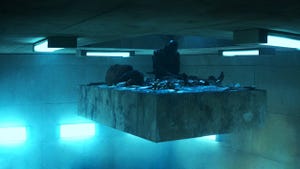
More People Need to Watch the Most Disturbing Sci-Fi Movie on Netflix - CNET
You should watch The Platform, a 2019 Spanish horror science fiction movie on Netflix. I watched it, and it’s excellent. But I’ll add that I’ll never watch it again. Ever.
It’s one of the most disturbing films I’ve seen in my entire life. After watching it, I thought about the movie and its complex meaning for days. The Platform is so gruesome and so unnerving I’m content to let the memory of it fade away. I’m glad it exists, but I don’t ever need to sit down and see it again. Here’s why.
The Platform takes place in a futuristic prison — a vertical tower, with an open hole in the middle of each cell. A platform stacked with food descends through the cells to feed the prisoners. This is the genius and horror of this movie.
The platform starts out laden with chef-created delicacies of all types. But it only stops briefly at each cell floor, where the two prisoners on that level have a very limited time to chow down on whatever they can get. And they can’t just shovel the food into their cell to be eaten later because they’ll be killed if they try to hoard anything.
So the prisoners on the top level get untouched food, and as the platform descends, it turns into a mess of half-chewed scraps and garbage. The top-level prisoners don’t care about the remaining food once it leaves them, so they don’t bother to keep The Platform hygienic, if you know what I mean and I think you do.
Prisoners are randomly assigned to a different level in the prison, and their level changes each month. If you’re near the top, you’ve got a good chance of getting some fairly un-mutilated grub. If you’re at the bottom, you’re essentially eating spat out, mauled leftovers — if anything edible is even left at all.
The metaphor of The Platform is obvious.
“There are three kinds of people,” a character intones. “Those at the top, those at the bottom, and those who fall.”
Some people, often through pure luck or chance, end up at the top of the heap, dining on the finest delicacies and living a fairly easy life. I think of those silver-spoon babies who it’s said were “born on third base, and think they hit a triple.”
Others arrive at the bottom of society and, short of winning the lottery, are likely to die before they move up. They’ll also often do nearly anything to advance.
And there’s another group — those who start out doing fine, eating well, placed on a high level where food is plentiful and unsullied. But then they tumble to a lower level, where the cakes and steaks they once enjoyed are only dreams. (Some, of course, do move higher. But in The Platform, if you’re not at the very, very top, you’re pretty much screwed.)
It may sound simplistic. You should take advantage of the opportunities to pull yourself up, to educate yourself, to feed yourself better. Yeah, in The Platform, none of that applies. You’re born — or placed — where you’re placed. A random draw determines if you go up or down, and how far in either direction. It’s not fair, but when you’re at the top, you take what you want without a thought for the ones doing worse.
As one character points out, if everyone in the prison only ate what they needed from The Platform, it would make its way down with enough food to feed everyone. But greed and fear and the gnawing memory of hunger mean that’s unlikely to happen.

Every day is a fight for survival in The Platform.
Netflix
You might think that’s enough for a plot in itself. But The Platform is packed with endless surprises, most of which I won’t give away. Here are just a few, and they’re not true spoilers because they take bizarre twists that you can’t even imagine reading them here:
- There’s a bloodied woman who rides the platform down, looking for her daughter, realizing that each level she descends to contains two prisoners who are as likely to try to kill her as not.
- Each prisoner is allowed one item to bring into the prison with them, and some of those items are odd. (The lead character chooses a copy of Don Quixote.) Like Chekov’s gun, they’re never unimportant.
- Prisoners believe there are 200 levels. Emphasis on “believe.”
- We don’t know nearly as much about the prisoners, the prison or really anything in this movie as we think we do.
Now, I’m a Gen Xer, raised in the era of slasher movies. I’ve seen disturbing films. I’ve watched Audition, Clockwork Orange and even Human Centipede. (I’m so, so sorry about that last one.)
But The Platform is different. Its social commentary might seem obvious: Be kind to those below you, because you never know when you’ll be at the bottom yourself. But director Galder Gaztelu-Urrutia and screenwriters David Desola and Pedro Rivero take a seemingly simple concept and deliver it in a world-shaking way.
I don’t want to watch The Platform again. But every so often, I think about it. The plot still crawls around my mind, and I’m not sure I’ll ever be completely free of it.


